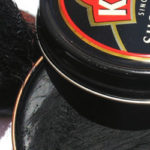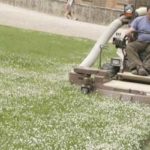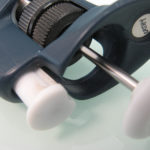Nick Oswald
After obtaining his PhD from the Dundee University School of Life Sciences, Nick Oswald moved into to industry, first working in a small team that designed Sophion Bioscience’s prototype Q-Patch system and then developing industrial bioprocesses with Ingenza Ltd.
His time at the bench gave him the feeling that a) he would like to move into writing and publishing and b) he had something to offer in helping researchers to share their professional know-how to make science more efficient, more successful, and more enjoyable to be a part of.
So while still working in the lab in 2007 he started BitesizeBio.com and began writing about what he knew himself. His first article was titled “5 DNA Ligation Tips” and was quickly followed by further articles about laboratory techniques soft skills and life skills gleaned from his experience in the lab. As researchers found his articles on Google, some came forward to contribute their expertise in articles and so began the growth of Bitesize Bio into the huge and vibrant knowledge-sharing community it is today.
Bitesize Bio became Nick’s full-time job in 2010 but prior to that, while growing Bitesize Bio, he cut his teeth in publishing and marketing with stints of work with Cold Spring Harbor Laboratory Press and the journal, Neuroendocrinology.
These days Nick is focused on the further growth and improvement of Bitesize Bio as a knowledge-sharing hub, other projects within his company Science Squared Ltd, and assisting biotech companies to market their products and services with genuinely useful educational material via Bitesize Bio and the Life Science Marketing Society.
Articles by Nick Oswald
How often do you make errors in the lab that ruin a good experiment? Rather than flaws in experimental design, I mean errors like forgetting to add a reagent, pipetting the wrong amount or following a protocol step wrongly. Especially early on in your career, errors like this can be a real drain on your…
TAE or TBE, which is best? Well, of course, it depends on what you want to do. Here are the pros and cons of both: TBE (Tris-borate-EDTA) is a better conductive medium than TAE (Tris-acetate EDTA) so is less prone to overheating so use TBE for long runs Borate is an enzyme inhibitor so TBE…
My PhD was a soul-less affair. It was also rock-less, jazz-less and pop-less. And all because my supervisor was of the opinion that music in the lab was a distraction that reduced concentration and our ability to do the job. “Rubbish!”, I thought, “Nothing helps you through a mindless task like splitting cells, pipetting or…
You youngsters don’t know how easy you’ve got it. Kits, outsourcing and improved practices are making research easier and easier. At least in theory (who are we kidding?). In the old days things were much tougher, and many wiley old scientists bear the scars, mental and physical, of carrying out techniques that were mind numbing,…
No-one would disagree with the goals of open access publishing: free access to scientific literature for all. If you work in an institution or small company that can’t afford to pay journal subscription fees you’ll know the problems that lack of access can cause. But publishing costs money, and someone has to pay those costs.…
So you finally got your PhD (or your masters or batchelor’s) and you are making the big switch to a small biotech company. You will probably have been hired for the specific skill set that you have built during your training, but now you have to learn to apply those skills to solve real world,…
The following question was emailed to Bitesize Bio by Beheroze Sattha and I gladly took up the challenge, and I immediately knew the answer. Or so I thought. After delving extensively into Pubmed, Genes V (I know, I need a new version) and Molecular Cloning I have come up with an answer, but it is…
Criticism is not just valuable, it is essential for a person’s development as a scientist, or anything else for that matter. Well that’s not entirely true. Not all criticism is valuable, it has to be the right kind of criticism. It has to be constructive and better still, well delivered in order to inspire the…
Really great presentation skills. Some people in science seem to have them, and some don’t. I am one of the don’ts. Sure, I can get up in front of people and talk when needed, but it won’t be a polished performance by any means. I can get my message across but my delivery is not…
Keeping safe in the lab really only requires one thing: common sense. But if you look at what people are doing in the lab, you might think that common sense isn’t so common after all. What are the most stupid things you have seen people do in the lab to put the safety of themselves…
No matter how many times you look at it, it’s not going to change. You are planning your next cloning experiment, but there’s a problem. The only restriction enzyme that cuts in a suitable position on your plasmid vector also, as luck would have it, cuts in another position elsewhere in the vector so you…
Going to conferences normally involves a significant investment of time and money. So it’s important to get as much as you can out of them. One of the most valuable things you can get from a conference is contacts. These can build into a network of people that will be valuable to you throughout your…
RPM and RCF are two units that can be used to describe the speed of a centrifuge. Although they may look similar, they are oh-so-different and confusing them has resulted a disastrous end to many an experiment. So let’s set it out in black and white to make sure you don’t succumb to the same…
After ligation, the method you use for desalting your sample prior to electroporation is critical, especially if your ligation is inefficient, according to a study by Schlaak et al [1]. Under standard electroporation conditions, the electric field of 12-18 kV/cm generated in a 0.1mm-gap electroporation cuvette means that the conductivity of the sample must be…
If you search the literature using a comprehensive search engine like Google Scholar, you will get several types of articles listed. Most of them are peer reviewed journal articles and many are patents. But beware of an important distinction between the two: Although patents can contain useful information, they are not authoritative because they are not…
Scientists often complain about the job, and here on Bitesize Bio we are no different. For an example, take a look at my rant about why not to be a scientist – written about a year ago after a particularly frustrating couple of weeks in the lab. Very recently, I decided to leave bench science,…
Undergrad courses teach you to learn in a specific way. You have to cram in as much information into your brain as possible, hold it in there, then regurgitate as much of it as possible on exam day. Of course, actually understanding what you are talking about, and working from basic principles, helps but the…
There is nothing more frustrating than getting back rubbish data from a DNA sequencing run, especially when you are waiting for an important result. For example, confirmation of that clone you have been trying to get for the past three months! A lot of the time, the quality of sequencing data is within your control.…
No scientist is an island, not even a great scientist like you. A good network of professional contacts is as essential to your career as hard work at the bench. This is because your network can open many doors that no amount of good bench work could. Access to unpublished information, collaborations and job opportunities…
Everyone is worried about getting results, aren’t they? Results are what you need for success in science – they are essential for bringing the funding in. But focusing on results per se is not a good way to work because, as a scientist, you can’t “get” results. You can’t “make” them happen. Essentially in every…
Where do you want to be, career-wise, in 1, 3, 5 or 10 years? Is the position you are in at the moment helping you to reach that goal, or are you stagnating? These are questions I think everyone should be asking themselves at least a couple of times a year. Career Growth During Study…
Powerpoint is a double-edged sword. There’s no doubt it makes putting together a presentation easier. Those who worked with slides, overhead projector films and the like in the years B.P. (Before Powerpoint) will testify to that. But Powerpoint’s ease of use also makes it easy to abuse, and bullet points are the most abused feature…
You are not alone. Everyone makes a hash of their protein gel sometimes but this resource can help you work out what went wrong, and feel better for seeing gels even worse than yours.
Your DNA samples are precious so take care of them! Here are 5 ways that DNA can be damaged, so now you now what to avoid in the future.
Ever heard of polymerising agarose gels? I haven’t. If you think you have, read this.
DEPC. IF you work with RNA, you’ll know this stuff. It’s vital for ridding solutions of RNases that would otherwise destroy your work. But just how well do you know it?
This is the story of how one of the most famous and quirky naming conventions in biology came into being.
Calculating your fudge ratio can help you get your work done on time and get home before dark. Here’s how.
Biology researchers have a bad habit of doing accurate assays using semi-accurate tools. Here are some suggestions on how to sharpen up the accuracy of your assays.
You probably use and rely them more than any other tool in the lab, but just how accurate are your pipettes?
As far as your lab work is concerned, your lab book is the source of all knowledge. Making it easy to find things in there will help. Here’s how to do it.
Bioscientists are generally nature-lovers at heart, but the average bio lab is incredibly wasteful. Here are some ways to reduce your lab’s environmental impact.
In the US it’s called Grad School, but in the UK we just call it “doing a PhD”. Here’s how I chose my PhD position, and some resultant advice for those currently looking for a PhD.
An introduction to the Monash protein folding database, which contains protocols for refolding over 600 different proteins from inclusion bodies.
Could ligation independent cloning get any better? Well here is a technique that is sequence AND ligation independent.
Multi-tasking used to be my favourite way to get ahead. During my PhD I saw others around me working extremely long hours in the lab and not really having much of a personal life and quite early on I made the decision that this was not for me. Although I enjoy my work, having a…
Several peer-reviewed articles advocate using microwaves for sterilization, but would you trust microwave-sterilized growth medium?
If you have ever worked out the price of an electroporation cuvette you will realise that, at several dollars each, they are worth recycling. Accounts on how amenable electroporation cuvettes are to recycling vary, but I find that as long as you treat them well it is possible to use single cuvette many times. It’s…
Cover letters are possibly the most important documents you will write in your career because they can open or close the door to your dream job. But, surprisingly, people often under-estimate their importance and assume that they are just the lesser companion to the CV/resume. Of course, that’s not the case. Your cover letter should…
Problems with DNA gel extraction can be a real show-stopper since this is such a routinely used procedure. But, even if you are having no particular problems, it’s always nice to try and pick up some information that might improve your technique just that little bit. Probably for these very reasons, Suzanne’s article 10 Tips…



























